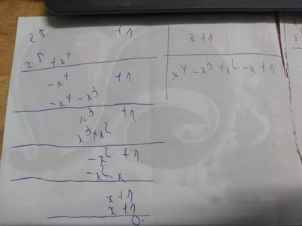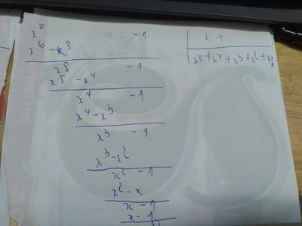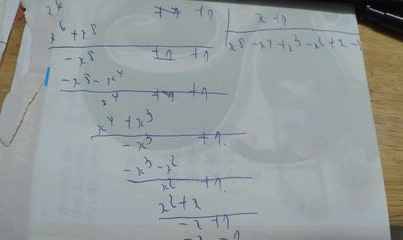thực hiện phép chia sau [cột]
(x^5+1) : (x+1)
(x^6-1) : (x-1)
(x^6+1) : (x+1)
cứu tui cứu tui
Hãy nhập câu hỏi của bạn vào đây, nếu là tài khoản VIP, bạn sẽ được ưu tiên trả lời.





=>(x+m)(x-1)+x^2-9=2(x^2+2x-3)
=>x^2-x+mx-m+x^2-9=2x^2+4x-6
=>x(m-5)=-6+m+9=m+3
Để phương trình có nghiệm duy nhất thì m-5<>0
=>m<>5

\(a,-\dfrac{4}{7}-x=\dfrac{3}{5}-2x\\ \Leftrightarrow x=\dfrac{41}{35}\)
\(b,\dfrac{5}{7}-\dfrac{1}{13}+\dfrac{1}{4}=\dfrac{31}{2}-x\\ \Leftrightarrow x=\dfrac{5319}{364}\)

\(2^{2x+1}-4^x=16^x\)
\(\Leftrightarrow2^{2x}.2-4^x=\left(4^2\right)^x\)
\(\Leftrightarrow4^x.2-4^x=4^{2x}\)
\(\Leftrightarrow4^x=4^{2x}\)
\(\Leftrightarrow x=2x\)
\(\Leftrightarrow x=0\)

phương trình nghiệm nguyên kiểu này liệt kê ước rồi kẻ bảng ra nhé

\(x^3:\left(-\dfrac{1}{2}\right)^2=\dfrac{1}{2}\)
\(\Rightarrow x^3:\left(\dfrac{1}{2}\right)^2=\dfrac{1}{2}\)
\(\Rightarrow x^3=\left(\dfrac{1}{2}\right)^2\cdot\dfrac{1}{2}\)
\(\Rightarrow x^3=\left(\dfrac{1}{2}\right)^3\)
\(\Rightarrow x=\dfrac{1}{2}\)
\(x^3:\left(-\dfrac{1}{2}\right)^2=\dfrac{1}{2}\Rightarrow x^3=\dfrac{1}{2}.\left(-\dfrac{1}{2}\right)^2=\dfrac{1}{2}.\left(\dfrac{1}{2}\right)^2=\left(\dfrac{1}{2}\right)^3\)
\(\Rightarrow x=\dfrac{1}{2}\)

a) 5 chia hết cho x+1 nên x+1 = -5;-1;1;5 => x= -6;-2;0;4.
b) Ta có : x + 9 = x+ 6 + 3.Vì x+6 chia hết cho x+6 nên để x+9 chia hết cho x+6 thì 3 chia hết cho x+6
=> x + 6 = -3;-1;1;3 => x = -9;-7;-5;-3

Câu 1:
A={1;3;5;7;9}
Câu 2:
A. 24 x 82 + 24 x 18 - 100
= 24 x (82 + 18) - 100
= 24 x 100 - 100
= 2400 - 100 = 2300
B.12 + 3 [ 39 - (5 - 2 )2 ]
= 12 + 3. [39 - 32 ]
= 12 + 3 . [39-9]
= 12 + 3.30
= 12 + 90 = 102

Đề yêu cầu gì vậy em, phải có yêu cầu cụ thể mới cứu em được chứ nhỉ?

=>3x(1-1/6)=3/4
=>3x=3/4:5/6=3/4*6/5=18/20=9/10
=>x=3/10
Đề là \(3x\left(\dfrac{1}{1}\times\dfrac{1}{2}+\dfrac{1}{2}\times\dfrac{1}{3}+\dfrac{1}{3}\times\dfrac{1}{4}+\dfrac{1}{4}\times\dfrac{1}{5}+\dfrac{1}{5}\times\dfrac{1}{6}\right)=\dfrac{3}{4}?\)
`3x (1/1 \times 1/2 + 1/2 \times 1/3 + 1/3 \times 1/4 + 1/4 \times 1/5 + 1/5 \times 1/6) = 3/4`
\(3x\left(\dfrac{1}{1\times2}+\dfrac{1}{2\times3}+\dfrac{1}{3\times4}+\dfrac{1}{4\times5}+\dfrac{1}{5\times6}\right)=\dfrac{3}{4}\)
\(3x\left(\dfrac{1}{1}-\dfrac{1}{2}+\dfrac{1}{2}-\dfrac{1}{3}+\dfrac{1}{3}-\dfrac{1}{4}+\dfrac{1}{4}-\dfrac{1}{5}+\dfrac{1}{5}-\dfrac{1}{6}\right)=\dfrac{3}{4}\)
\(3x\left(1-\dfrac{1}{6}\right)=\dfrac{3}{4}\)
\(3x\times\dfrac{5}{6}=\dfrac{3}{4}\)
`3x=3/4 \div 5/6`
`3x = 9/10`
`x = 9/10 \div 3`
`x = 3/10.`